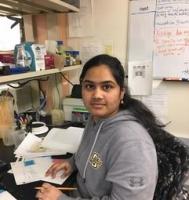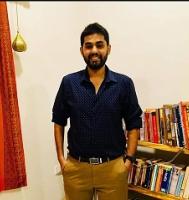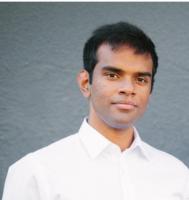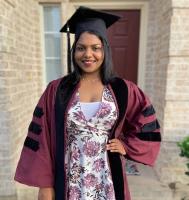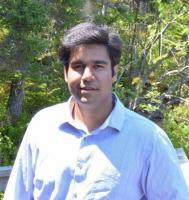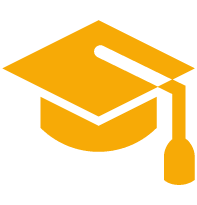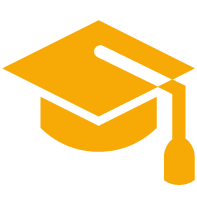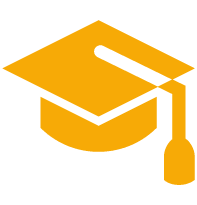School of Bio and Chemical Engineering
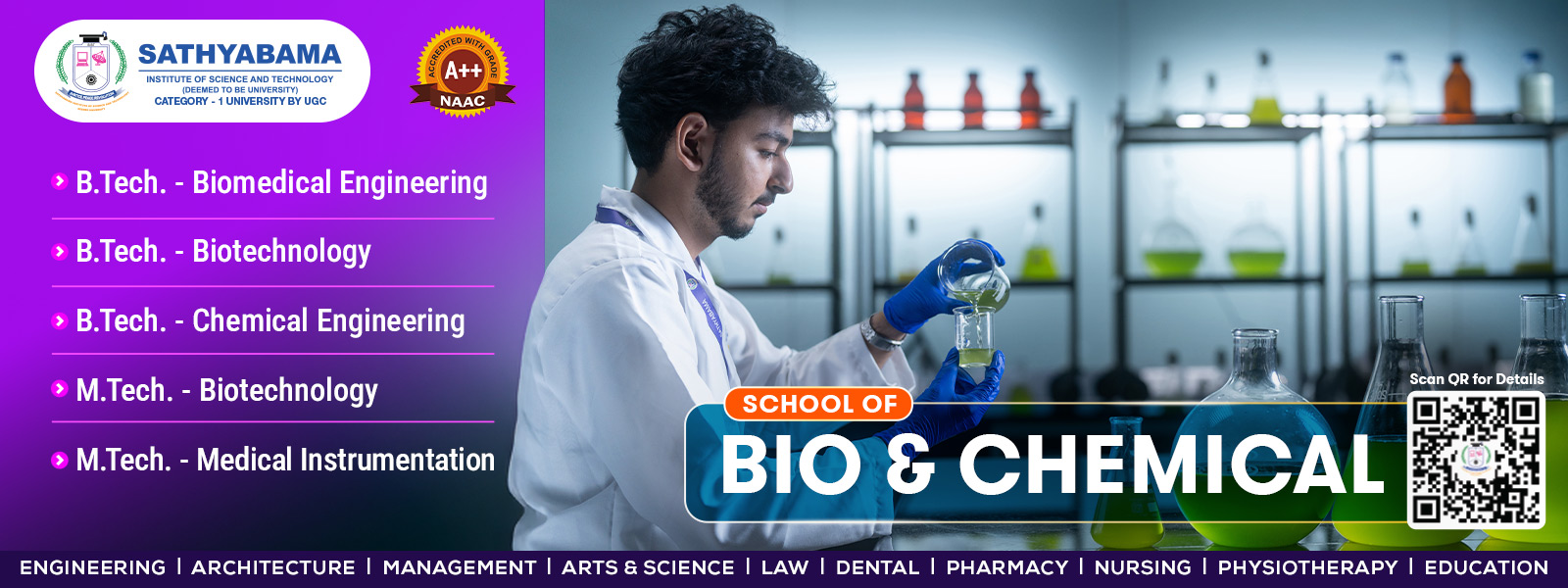
The School of Bio and Chemical Engineering is committed to provide the students with a wide range of opportunities in the modern world. The School of Bio and Chemical Engineering comprises of Biotechnology, Biomedical Engineering, Bioinformatics and Chemical Engineering departments. The various undergraduate programs offered by the school include B.Tech. in Biotechnology, B.Tech. in Biomedical Engineering, B.Tech. in Chemical Engineering, B.Sc. Biotechnology, B.Sc. Microbiology, B.Sc. Biochemistry and B.Sc. Data Science and Bioinformatics. To promote higher education, the following postgraduate programs are also offered by the school; M.Tech. in Biotechnology, M.Tech. in Medical Instrumentation and M.Sc. in Data Science and Bioinformatics. The school fosters Ph.D. in bioengineering, Chemical Engineering and life sciences.
The departments are equipped with state-of-the-art technology to empower the students compete in the global arena. The school aims to inculcate the students with value education and ample practical skills. The strength of the departments lies in the academic laboratories with adequate instrumentation to impart practical technical skills to the students. A wide range of laboratories including the basic Biochemistry laboratory to the advanced Molecular Biology laboratory reinforces theoretical knowledge. The Chemical engineering laboratories comprising of Environmental Engineering laboratory, Mass transfer laboratory, Fluid mechanics laboratory and Chemical reaction engineering laboratory aids in practical learning. The Biosciences laboratory along with the Electronic devices laboratory and Biotherapeutic laboratory ensures effective learning of Biomedical concepts. A biocomputing laboratory satisfies the need for computer-enhanced technical knowledge transfer. The faculty members publish research papers in impactful journals in synergy with research centres. A central research facility - CBiRD (Centre for Bioresource Research and Development) is a place for promoting research amongst the faculty and students.
The School has entered an MoU (Memorandum of Understanding) with various industries wherein collaborative research and training for students in real-time under industry conditions are provided. A steady placement record of the school, above 90% every year, provides a direction for the aspiring graduates. The study abroad programme ensures a launchpad for the students who would want to pursue higher studies abroad. In coordination with the Technology Business Incubator cell of Sathyabama, young entrepreneurs are nurtured leading to startups. By promoting extracurricular activities (NSS, NCC, YRC and other student development cell activities) the school ensures all-round development in the students.
Our Top Recruiters
STUDENT TESTIMONIALS
Programme Offered
UG
UG
- B.Tech. - Biotechnology
- B.Tech - Biomedical
- B.Tech - Chemical
- B.Sc - Biotechnology
- B.Sc - Microbiology
- B.Sc - BioChemistry
- B.Sc- Bioinformatics and Data Science
PG
PG
- M.Tech. - Biotechnology
- M.Tech. - Medical Instrumentation
- M.Sc.- Bioinformatics and Data Science
- M.Sc.- Medical Biotechnology and Clinical Research
Ph.D.
Ph.D.
- Ph.D in all disciplines
The Department of Biotechnology has made a significant leap in to the research field with many extramurally funded projects from funding agencies such as the DBT DST with our esteemed faculty at the level of Principal Investigator and Co-principal investigators. More than 50 research scholars are pursuing their Ph.D. in different fields of Biology. Faculty members and research scholars are continuously involved in publishing their research work in highly reputed peer reviewed journals of impact factors and are actively participating in various Conferences and Faculty Development Programs. The department also hosts many professional association activities such as the Indian Association of Applied Microbiology, Association of Microbiologist in India and Indian Association of Microbiology.
Research
- Funded Projects
- Publications
- Patents
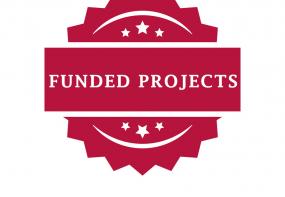
Extramural funds from various agencies like DST, DBT, CSIR, AICTE, UGC and ICMR help in promoting research amongst the academic faculty. Also the funds aid in enhancing the research facilities and encourages research temperament in the minds of the younger generation.
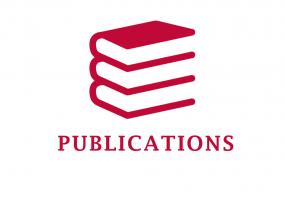
Quality research results in the publications that in turn has an impact amongst the scientific community. Publications communicate the novel research that is being carried out and thereby enhances collaboration. Research articles also remains a resource for the younger generation to enhance their research attitude.
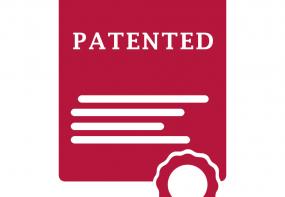
Innovative ideas and novel compounds result in patents. New technologies as a result of societal needs demand innovation. Patents provide validation of innovation and also enthuses the student community which is vibrant in thought to come up with innovative and novel ideas and products.
- The department of Biotechnology envisages to empower the students with analytical skills and to create an ethical workforce, competent to transform the future with social consciousness on par with global standards.
- To enable the students to acquire technical skills in core aspects of Biotechnologies pertaining to the development of innovative technologies.
- To increase the employability of students by exposing them to various industrial, academic and research environment.
- To inculcate leadership and inter-personal skills by involving students in diversified activities.
- To instill the societal and ethical responsibility in our students.
- PEO 1 – Excel globally with strong fundamentals, domain knowledge, updated with modern technology to provide effective solutions for technological problems.
- PEO 2 – Be a committed and motivated technologist with research aptitude, lifelong learning, investigative approach and multidisciplinary thinking.
- PEO 3 – Exhibit strong managerial and communication skills to work efficiently as individual as well as in teams.
- PEO 4 – Function as committed professionals with strong professional ethics and values, sense of responsibilities, understanding of legal, safety, health, societal, cultural and environmental issues.
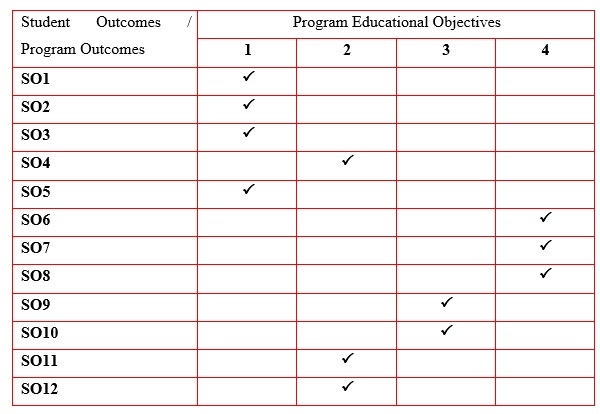
The general criteria student outcomes as defined by ABET – ANSAC is listed as follows;
- An ability to identify, formulate, and solve broadly defined technical or scientific problems by applying knowledge of mathematics and science and/or technical topics to areas relevant to the discipline.
- An ability to formulate or design a system, process, procedure or program to meet desired needs.
- An ability to develop and conduct experiments or test hypotheses, analyze and interpret data and use scientific judgment to draw conclusions.
- An ability to communicate effectively with a range of audiences.
- An ability to understand ethical and professional responsibilities and the impact of technical and/or scientific solutions in global, economic, environmental, and societal contexts.
- An ability to function effectively on teams that establish goals, plan tasks, meet deadlines, and analyze risk and uncertainty.
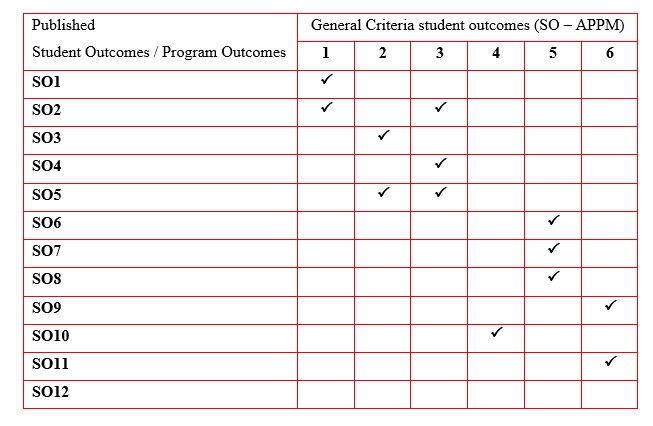
- PO1: Engineering Knowledge: Apply knowledge of mathematics, natural science, computing, engineering fundamentals, and an engineering specialization as specified in WK1 to WK4 respectively, to develop to the solution of complex engineering problems.
- PO2: Problem Analysis: Identify, formulate, review research literature, and analyze complex engineering problems, reaching substantiated conclusions with consideration for sustainable development. (WK1 to WK4)
- PO3: Design/Development of Solutions: Design creative solutions for complex engineering problems and design/develop systems/components/processes to meet identified needs with consideration for the public health and safety, whole-life cost, net zero carbon, culture, society, and environment as required. (WK5)
- PO4: Conduct Investigations of Complex Problems: Conduct investigations of complex engineering problems using research-based knowledge, including design of experiments, modelling, analysis & interpretation of data to provide valid conclusions. (WK8).
- PO5: Engineering Tool Usage: Create, select, and apply appropriate techniques, resources, and modern engineering & IT tools, including prediction and modelling, recognizing their limitations to solve complex engineering problems. (WK2 and WK6)
- PO6: The Engineer and The World: Analyze and evaluate societal and environmental aspects while solving complex engineering problems for its impact on sustainability with reference to economy, health, safety, legal framework, culture, and environment. (WK1, WK5, and WK7).
- PO7: Ethics: Apply ethical principles and commit to professional ethics, human values, diversity, and inclusion; adhere to national & international laws. (WK9)
- PO8: Individual and Collaborative Team work: Function effectively as an individual, and as a member or leader in diverse/multi-disciplinary teams.
- PO9: Communication: Communicate effectively and inclusively within the engineering community and society at large, such as being able to comprehend and write effective reports and design documentation, make effective presentations considering cultural, language, and learning differences
- PO10: Project Management and Finance: Apply knowledge and understanding of engineering management principles and economic decision-making, and apply these to one’s own work, as a member and leader in a team, and to manage projects and in multidisciplinary environments.
- PO11: Life-Long Learning: Recognize the need for, and have the preparation and ability for i) independent and life-long learning ii) adaptability to new and emerging technologies, and iii) critical thinking in the broadest context of technological change. (WK8)
- PSO1: Conceptualize and implement solutions for the technical problems in the healthcare domain and environment.
- PSO2: Validate high throughput technologies, in-vivo and in-vitro cell and tissue culture techniques thereby meet the global research standards.
- PSO3: Exemplify bioprocess techniques enabling novel technological advancements leading to bioentrepreneurship.
- DST-FIST sponsored department (Rs.80 crores)
- Consistent 90% placement record
- Study abroad programme
- Sathyabama Technology Business Incubator collaborated startups
- Memorandum of Understanding with various Industries
- Department H index of 21
- Extramural projects to the tune of Rs.2.5 Crores
- Excellent Academic Infrastructure
- Curriculum with focus on industrial needs
- Granted Patents from the department - 15
- Extensive book bank
- Fee Waiver scholarship for meritorious students
- Training for in-house projects
- Collaboration with research centres
- Professional training (Internship) inclusive curriculum
- Skill development activities
- IAS coaching (Jeppiaar IAS Academy)
- GATE coaching
- Foreign language training
- Outreach programmes
- NPTEL courses and publications by advanced learners
- Rigorous Placement training
- Workshop, Seminar and Symposia for research enhancement
Sathyabama Institute of Science and Technology places emphasize on co-curricular and extracurricular activities These activities are student centered and primarily aims to supplement regular curricular activities.Its goal is to represent the student body in making the study experience as rewarding and enjoyable as possible.
Academic Calendar
Student Council
Course Materials
Scholarship Scheme
Advisory Bureau for Higher Studies
Student Development Cell
Student Chapter
Counselling Services
Help Desk
Anti Ragging Cell
Women Grievance Cell
SC / ST Cell
Industry Institute Interaction Cell
Anti - Discrimination Cell
Students Grievance Redressal Cell
Student Achievements
Student Handbook
Entrepreneurship Development Cell
Skill Development Centre
Internal Complaint Committee
NCC/NSS/YRC
Centre for Academic Partnership & International Relations is an initiative of Sathyabama Institute of Science and Technology devoted to promote academic alliances with Universities and Institutes at National and International level. The Centre establishes a link through Memorandum of Understanding to facilitate Research Collaboration, Student Exchange Programmes and Faculty Exchange Programmes.
WK1: A systematic, theory-based understanding of the natural sciences applicable to the discipline and awareness of relevant social sciences.
WK2: Conceptually-based mathematics, numerical analysis, data analysis, statistics, and formal aspects of computer and information science to support detailed analysis and modelling applicable to the discipline.
WK3: A systematic, theory-based formulation of engineering fundamentals required in the engineering discipline.
WK4: Engineering specialist knowledge that provides theoretical frameworks and bodies of knowledge for the accepted practice areas in the engineering discipline; much is at the forefront of the discipline.
WK5: Knowledge, including efficient resource use, environmental impacts, whole-life cost, re-use of resources, net zero carbon, and similar concepts, that supports engineering design and operations in a practice area.
WK6: Knowledge of engineering practice (technology) in the practice areas in the engineering discipline.
WK7: Knowledge of the role of engineering in society and identified issues in engineering practice in the discipline, such as the professional responsibility of an engineer to public safety and sustainable development.
WK8: Engagement with selected knowledge in the current research literature of the discipline, awareness of the power of critical thinking and creative approaches to evaluate emerging issues.
WK9: Ethics, inclusive behavior, and conduct. Knowledge of professional ethics, responsibilities, and norms of engineering practice. Awareness of the need for diversity by reason of ethnicity, gender, age, physical ability, etc with mutual understanding and respect, and of inclusive attitudes.
Insights
- Collaboration and MOU's
- Facilities
A Memorandum of Understanding was signed between the Department of Biotechnology, Sathyabama Institute of Science and Technology, and Anneo Biotech Pvt.Ltd. on 14-10-2024. The MoU aims to provide Internships for the Department of Biotechnology students, leading to Professional training and Job Opportunities. The MoU will also Facilitate collaborative research and joint research activities, leading to funding opportunities.

The department of Biotechnology collaborates with research institutions and industries to promote joint research activities and consultancy. The department has a memorandum of understanding (MoU) with the following organizations;
- Einnel Technologies, Chennai.
- Gleneagles Global Health City, Chennai.
- Knowledge Centre for Innovation Integrity and Implementation, Chennai.
- Lifecell International Private Ltd, Chennai.
- Y R Gaitonde Medical, Educational and Research Foundation, Chennai.
- Biozone Technologies, Chennai.
Dr. Swamy Mruthinti, Associate Dean and Professor, University of West Georgia, USA, visited our campus and addressed the students of the Department of Biotechnology,School of Bio & Chemical Engineering with his deliberation on "Diabetes- a risk factor for Inflammatory Diseases" on 8th July 2022. To develop academic and research cooperation, a Memorandum of Understanding (MOU) was also signed with University of West Georgia.
A Memorandam of Understanding (MoU) was signed between HUMCEN GLOBAL PVT LTD and Department of Biotechnology, School of Bio & Chemical engineering, Sathyabama Institute of Science and Technology on 11th Feb 2021 at Seminar Hall, International Research centre,Chennai-19.
Centre for Bioresource Research and Development - (CBiRD)
The Centre for Bioresource Research and Development (CBiRD) was established in 2009 to promote research in the department. Its objective is to meet the requirements of faculty members and students of the entire institute in terms of collaborative research in biotechnology. The Centre houses exclusive facilities for Molecular Biology, Transcriptomics, Plant tissue culture and Microbial technology. The faculty members and students utilize the facility for their project work and short term training needs. The Centre also shares the resources with other departments in the institute.
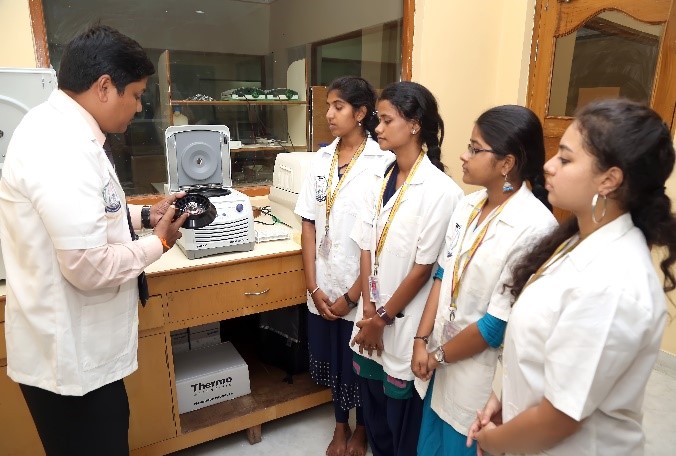
The Molecular Biology Laboratory consists Of Stereozoom Microscope and Thermocycler (PCR Machine). Research in this laboratory focuses on understanding the molecular mechanisms that regulate Dopamine Neurogenesis During Development and Regeneration. In Zebrafish with the aid of genetic and Molecular Tools.
Internships
- The students take up NPTEL courses the credits of which will be transferred.
- Life Cell Technologies is a major training centre for students.
- Biozone Technologies is a centre for research associated with the department where students are trained in short term hands-on workshops.
The Department of Biotechnology is furnished with well developed and active Biosciences and Bioengineering Laboratories. These provide an able platform for the demonstration of practical knowledge and enrichment of research activities. The Basic Biosciences Laboratories include Biochemistry, Immunology, Cytogenetics, Microbiology and Molecular Biology Laboratories. The department is also facilitated with Bioprocess Engineering, Genetic Engineering, Plant and Animal Tissue culture Laboratories, Project Lab I & II, Research Lab (Centre for Bioresources Research and Development) and FIST funded AFM Lab (International Research Centre) to encourage and equip faculty and students keeping abreast with the growing technologies. All the laboratories are maintained and highlighted by high-end equipments and chemicals meeting both Research and Industrial needs.
List of Programme- Specific Laboratories
- Molecular Biology Lab
- Plant Tissue culture Lab
- BioProcess Engineering Lab-I
- BioProcess Engineering Lab-II
- Genetic Engineering
- Animal Tissue Culture Lab
- Biochemistry Lab
- Microbiology Lab
- Immunology Lab
- Cytogenetics Lab
Other Facilities
- Project Lab-I
- Project Lab –II
- Research Lab
- FIST funded AFM LAB (International Research Centre)
Molecular Biology & Genetic Engineering Lab
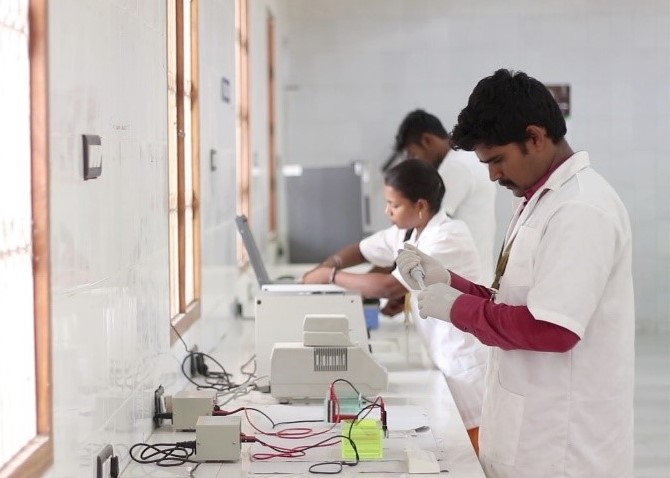
Molecular Biology and Genetic Engineering lab offer students an opportunity to have hands-on training in basic as well as advanced molecular biology techniques. The experiments conducting in this lab will be based on isolation, separation and staining of nucleic acids as well as independent usage of modern genetic engineering tools like PCR, restriction mapping, cloning and hybridization. The lab is well equipped with Thermal cycler, spectrophotometer, water baths, centrifuges and incubators.
Plant Tissue Culture Lab
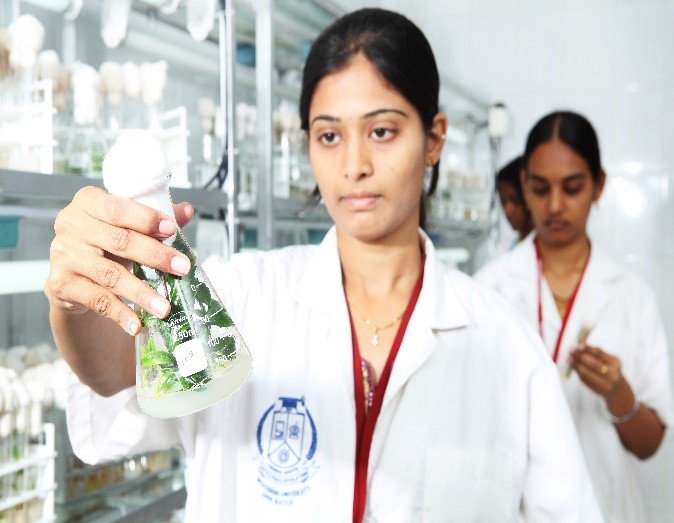
The plant tissue culture laboratory consists of a media preparation room, transfer room, and a culture room which are well maintained to keep the lab sterile. The Lab provides the facility for culturing isolated cells or tissues under sterile and controlled conditions obtained from any part of the plant like stem, leaf, flower bud, etc. Various types of tissues or cells are grown aseptically in different types of glass-wares containing a medium with mineral nutrients, vitamins and plant growth regulators. Tissue Culture techniques are being employed in this laboratory to give hands-on learning experience to the students in using a set of techniques/methodologies that can be applied in tissue culture industries as well as in research labs.
Bioprocess Engineering Lab
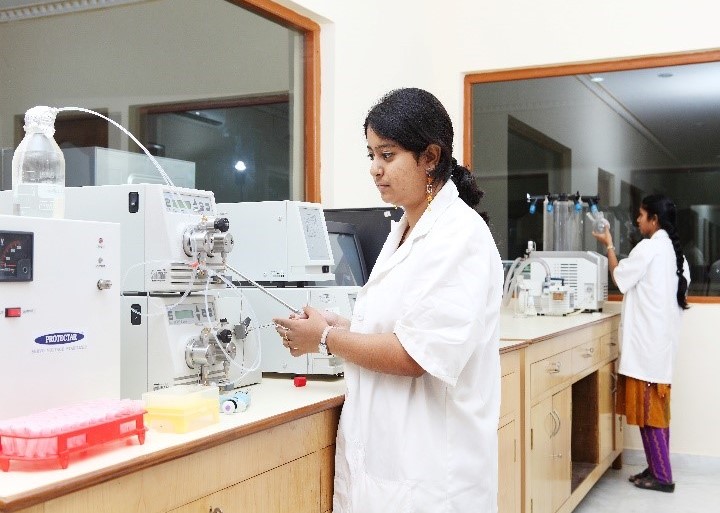
Bioprocess laboratory giving exposure to the students for Media Optimization, Growth kinetics Enzyme kinetics and Immobilization techniques. It also trains the students in Various techniques of Downstream processing like Sonication, Homogenization and chromatographic techniques which helps the students to come out with a wide knowledge and skills.
Animal Tissue Culture Lab
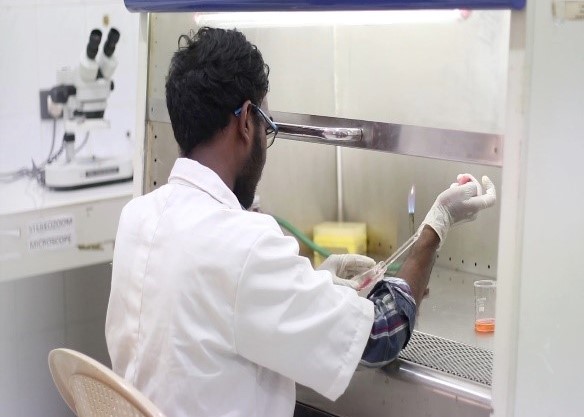
Animal and human cell culture methods lead to more breakthroughs in medical Biotechnology, including the production of vaccine, recombinant proteins, monoclonal antibodies (mAbs), and cells for transplantation. Cell culture refers to the culture of nucleated (eukaryotic) cells under prescribed conditions within the laboratory. Cell culture laboratory designed for the maintenance, preservation of cells and observation of cell morphology in cell biology works. Cell culture models can be used to test the potency and cellular toxicity of a biological therapy. There are several advantages, such as inarticulate manipulation of research conditions and significantly lesser costs. Students get hands on training in maintainance and preservation of cell lines, cytotoxicity analysis and genotoxic assays.
Biochemistry & Immunology Lab
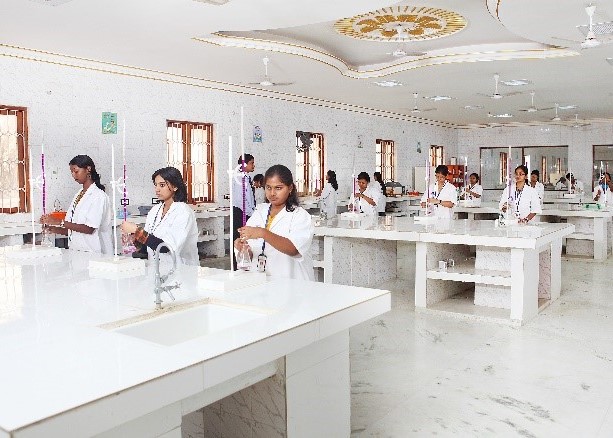
Biochemistry Laboratory provides a platform for the investigation of the chemistry of biological processes at the cellular and molecular level. It provides avenues to explore chemical changes in disease, drug action, and other aspects of medicine, as well as in nutrition, genetics, and agriculture. The students are trained to carry out both qualitative and quantitative analysis of various biomolecules and understand their scope in research and industry.
Immunology Laboratory provides opportunities for the students to understand the physiological functioning of the components of immune system in states of both health and diseases. The students are trained to carry out blood grouping, blood cell counting, antigen-antibody reactions and immunochemical techniques.
Microbiology & Cytogenetics Lab
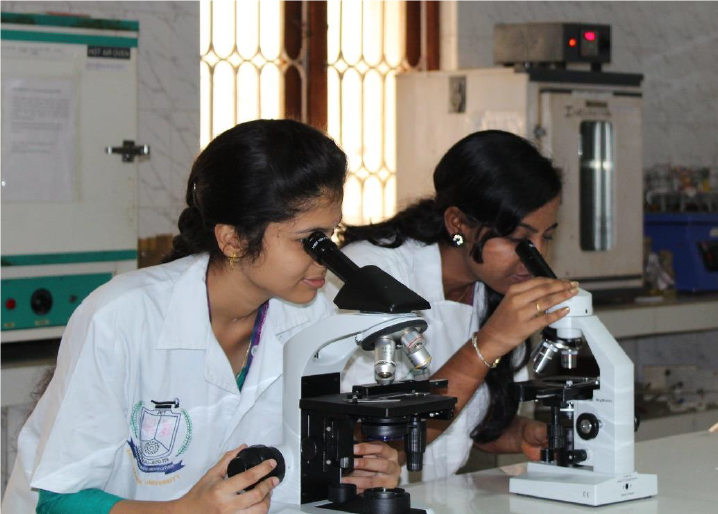
Microbiology Laboratory is providing the primary practical exposure knowledge on isolation techniques, characterization, Microbial quality analysis, Antibiotic sensitivity tests for Undergraduates and Masters of technology. This laboratory is equipped with biologically safety cabinets that provide an aseptic environment for the culturing, autoclave, hot air oven (sterilization of materials), incubator, orbital shaker (providing for optimum growth conditions. The students will experimentally demonstrate the knowledge gained from the Microbiology theory course. The students are encouraged to perform the experiments and interpret the results with the standard microbiological criteria.
Cytogenetics Laboratory focuses on the visualization of cells, cell staining techniques, observation of different stages of mitosis and meiosis in prokaryotic and eukaryotic cells and karyotyping.
Highlights of the Course Curriculum
- Choice Based Credit System
- Choice of Faculty for a course
- Professional Training courses
- Semester Abroad Programme
- Non Credit Courses imparting ethics
- Orientation / Induction programme
- Proficiency modules
- Credit transfer from certificate courses
- Value added courses
- Integrated placement training
The department of Biotechnology has an extensively integrated curriculum that caters to the needs of the industry in the future. However, the curriculum does have some gaps that have been identified by the faculty during the course delivery. To address these gaps a series of guest lectures by eminent people from the industry are conducted.
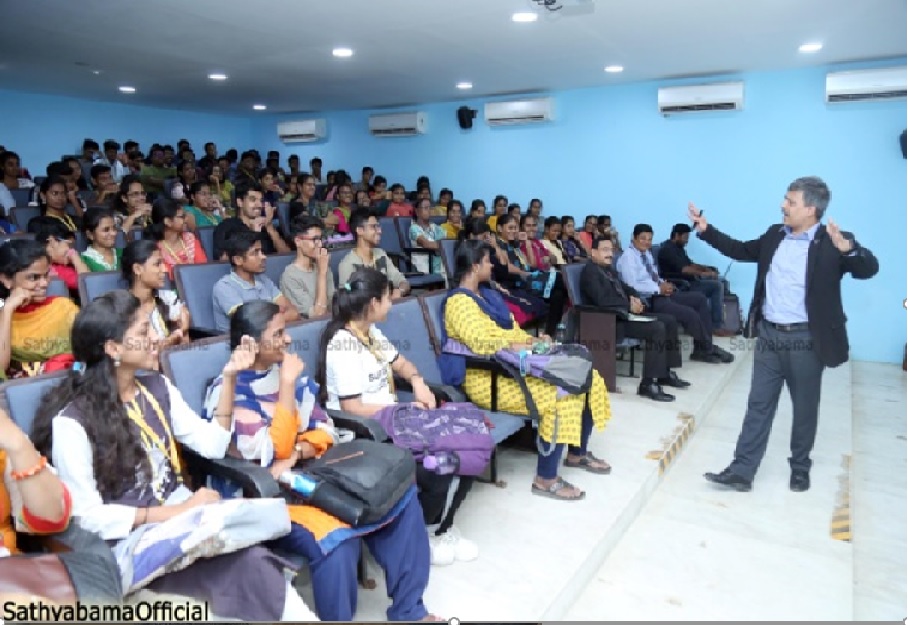
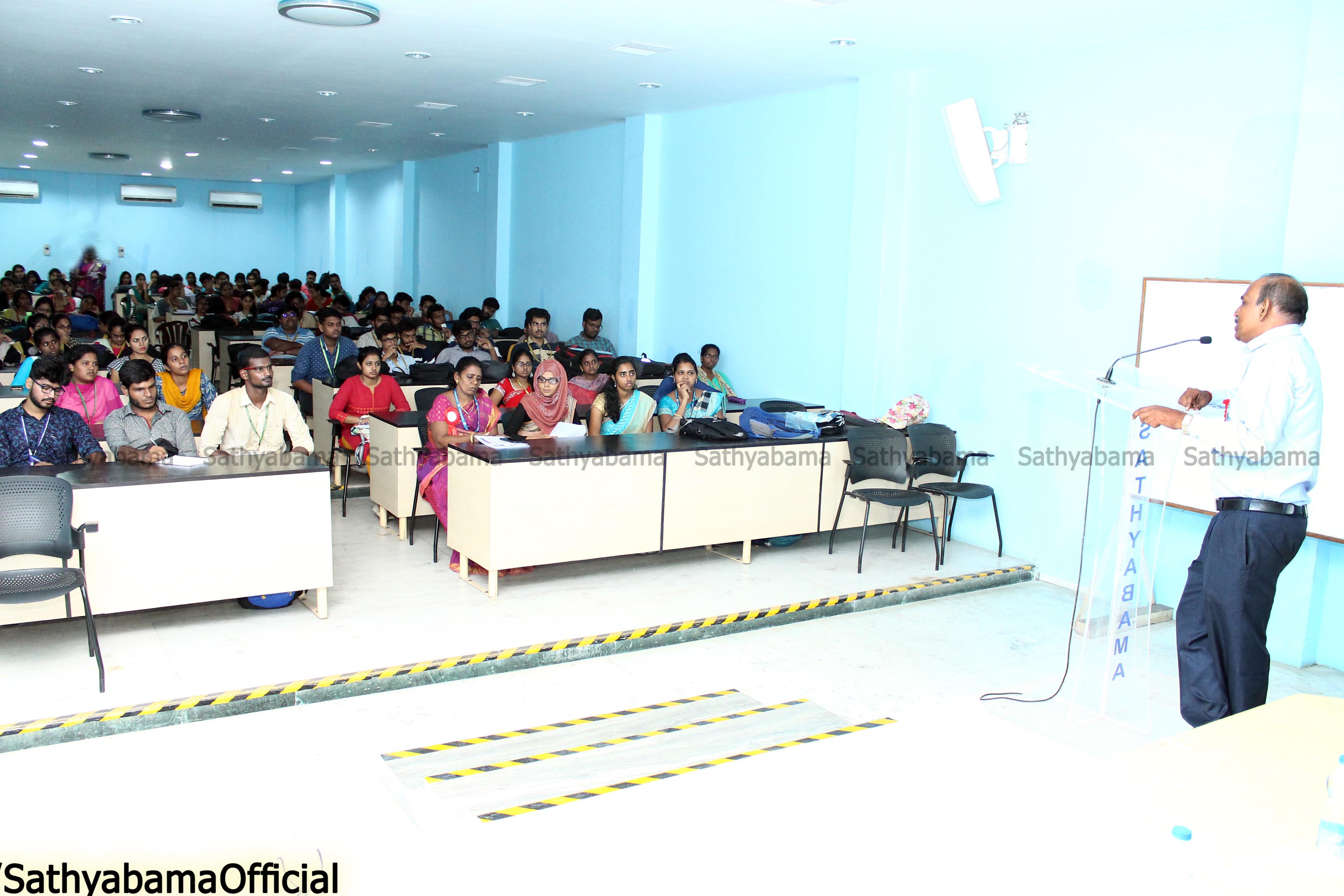
Also, students get a chance to interact with the guests to the department personally and clarify on their apprehensions. Many of the International conferences conducted in the campus attract guests from reputed institutions abroad with whom the students interact regularly.
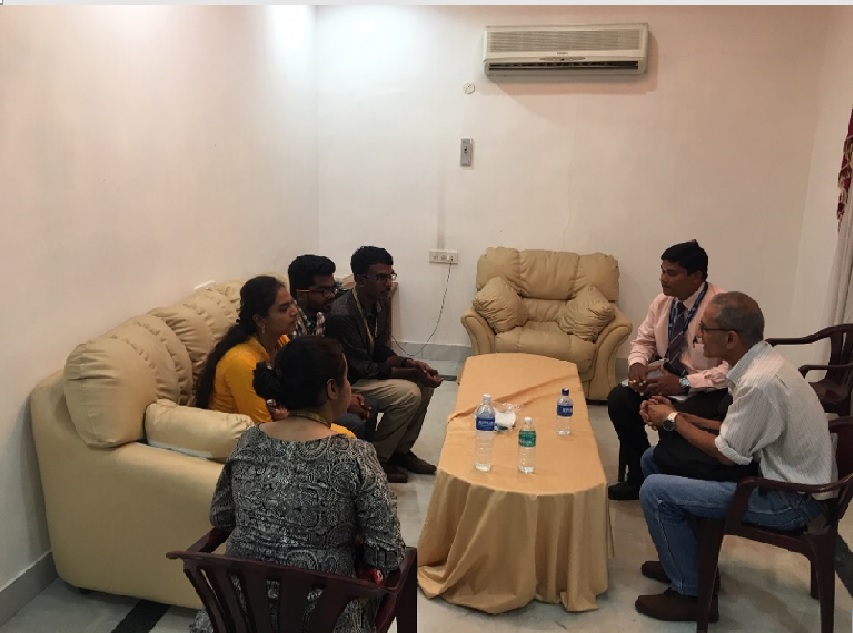
The IE(I) Biotechnology Student Chapter received the Best Student Chapter Rolling Trophy for the academic year 2024–25. The award was presented by our respected Mr. J. Arul Selvan, Vice President; Dr. G. Sundari, Assistant Registrar; and Dr. S. Karthikeyan, F.I.E., Chairman – IE(I) KLC and Head – IE(I), Sathyabama, on 20 December 2025.
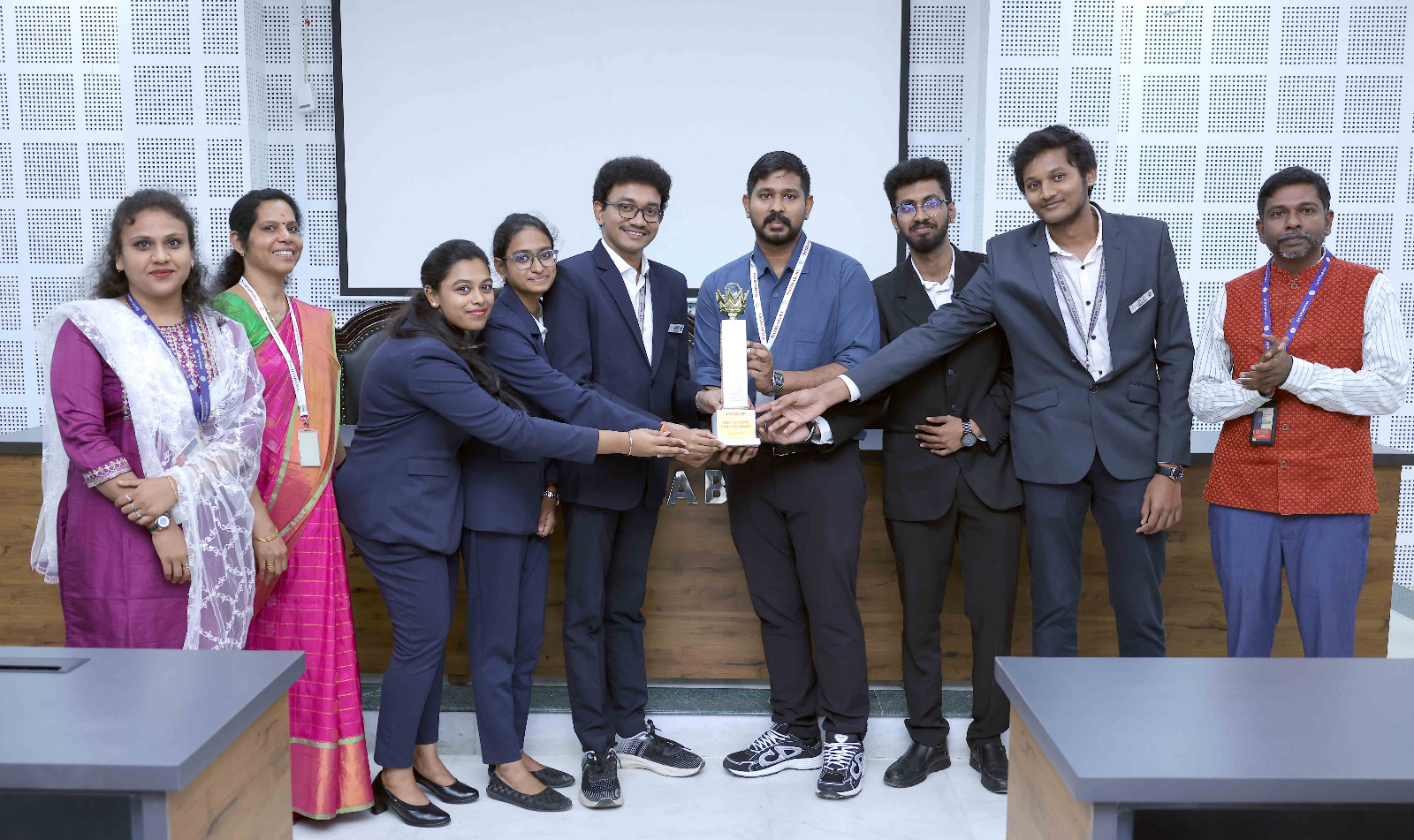
The Department of Biotechnology, School of Bio & Chemical Engineering organized an online National workshop on "Art of Successful writing" from 6th to 13th September 2021.
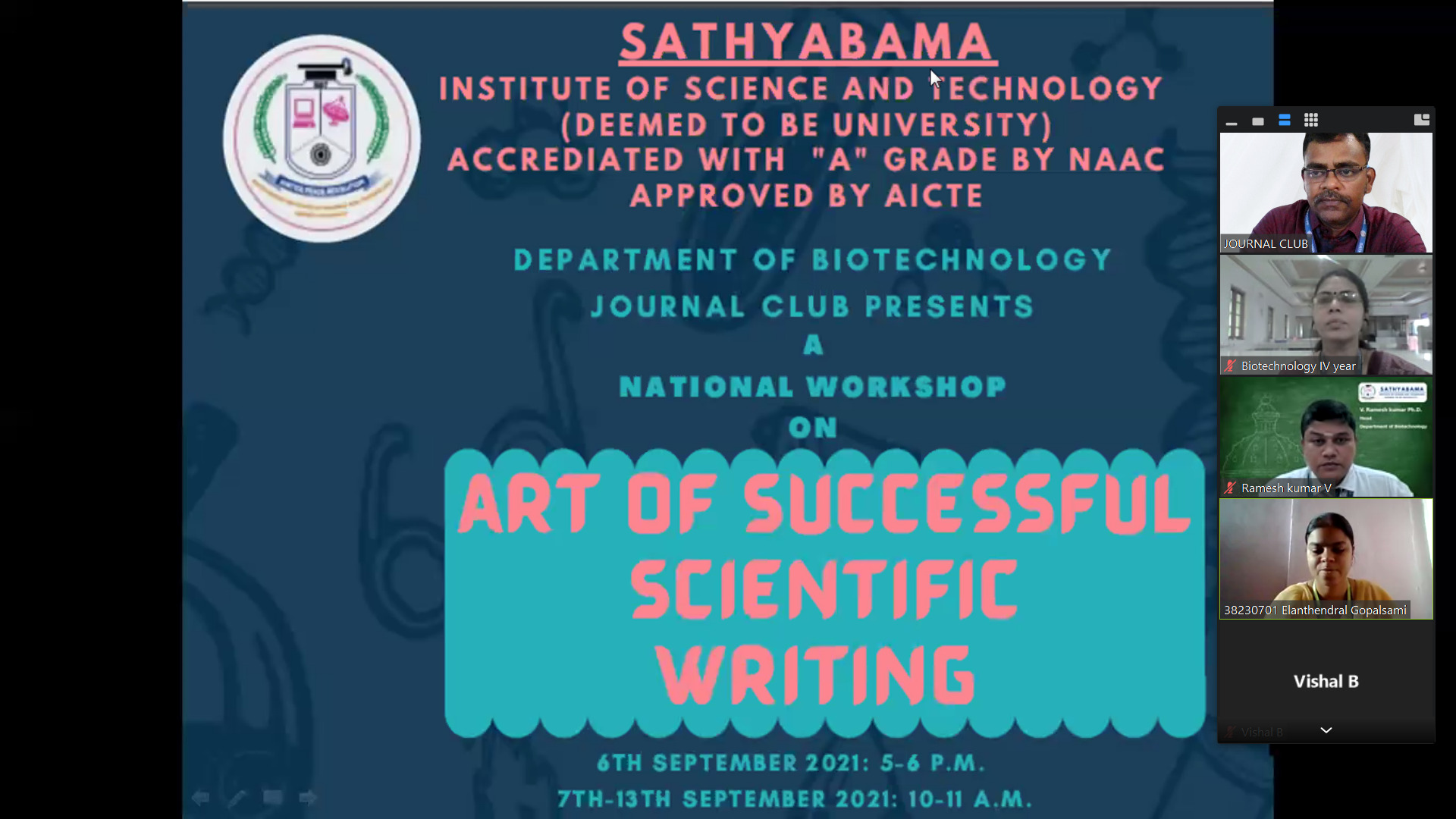
The Department of Biotechnology,School of Bio& Chemical Engineering organized an online guest lecture by Dr.Subbaiya, Associate Professor, Department of Biological Sciences, The Copperbelt university, Zambia on "Emerging Nano-strictures innovative materials as abdorbents in waste water treatment" on 29th September 2022 at 2pm.
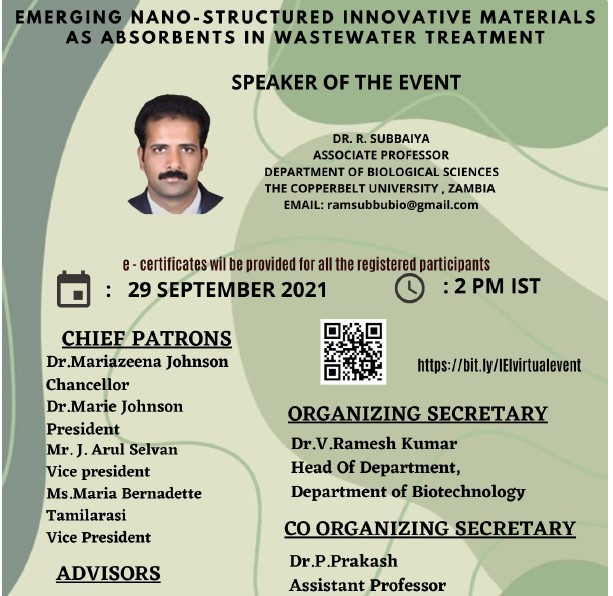
The Student development cell Eco club in association with Nature Science foundation initiated an "International Eco club student and staff chapter" on 11th June 2022 at IRC seminar hall, organized by the Department of Biotechnology, School of Bio & Chemical Engineering, Chennai-119.
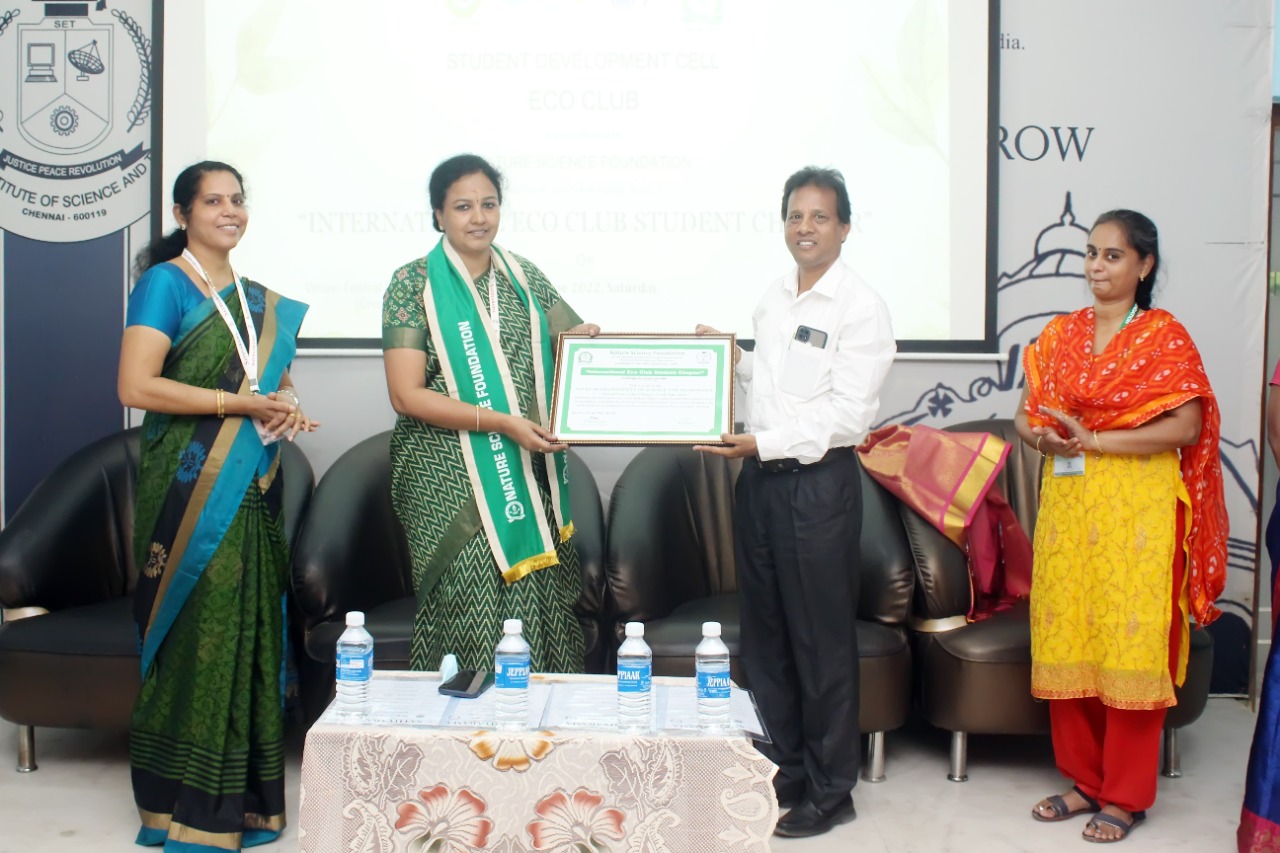
The “Food Safety Awareness Program” was conducted on 17th June 2022 at RemiBai Jeppiaar Auditorium, organized by Department of Biotechnology, Sathyabama Institute of Science & Technology.
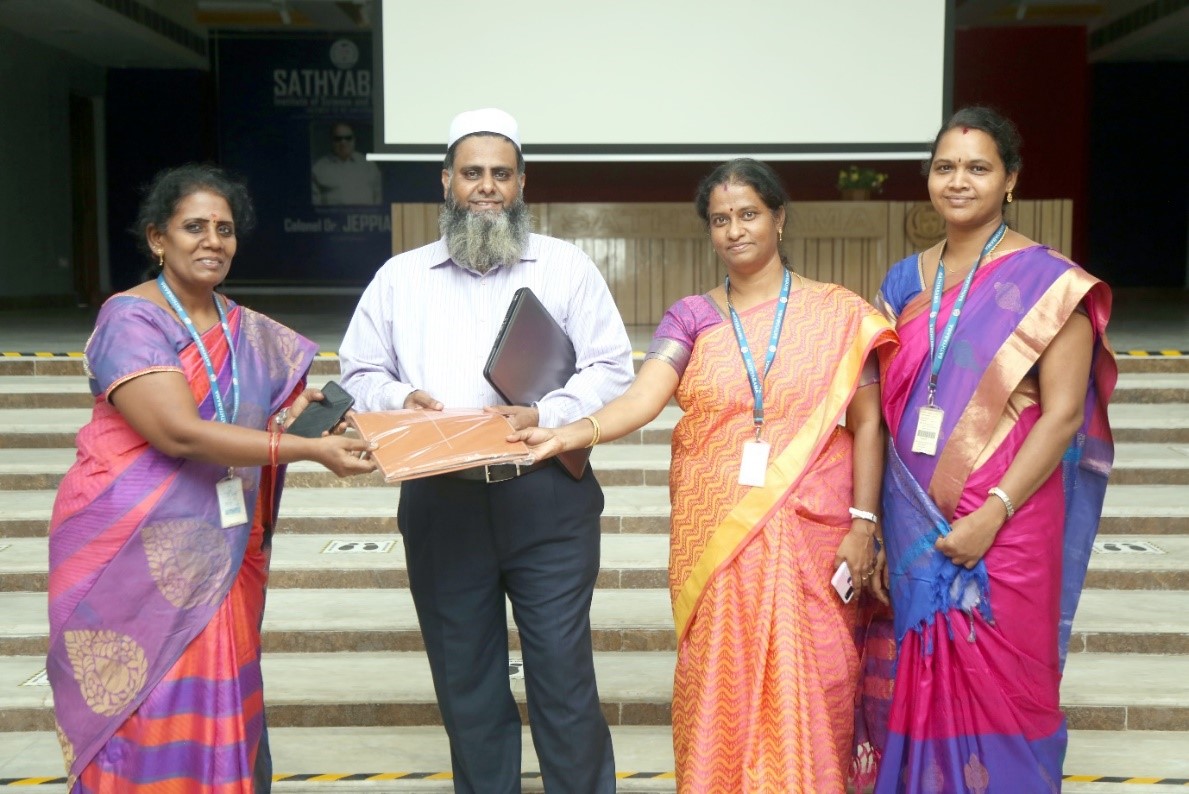
An Invited Talk by Dr.Antony Samrot, Dean in charge, Medical Sciences, MAHSA UNIVERSITY, Malaysia on “Research opportunities in nanobiotechnology” on 10th June 2022 on Seminar hall First floor, IRC organized by Department of Biotechnology, School of Bio & Chemical Engineering, Chennai-119.
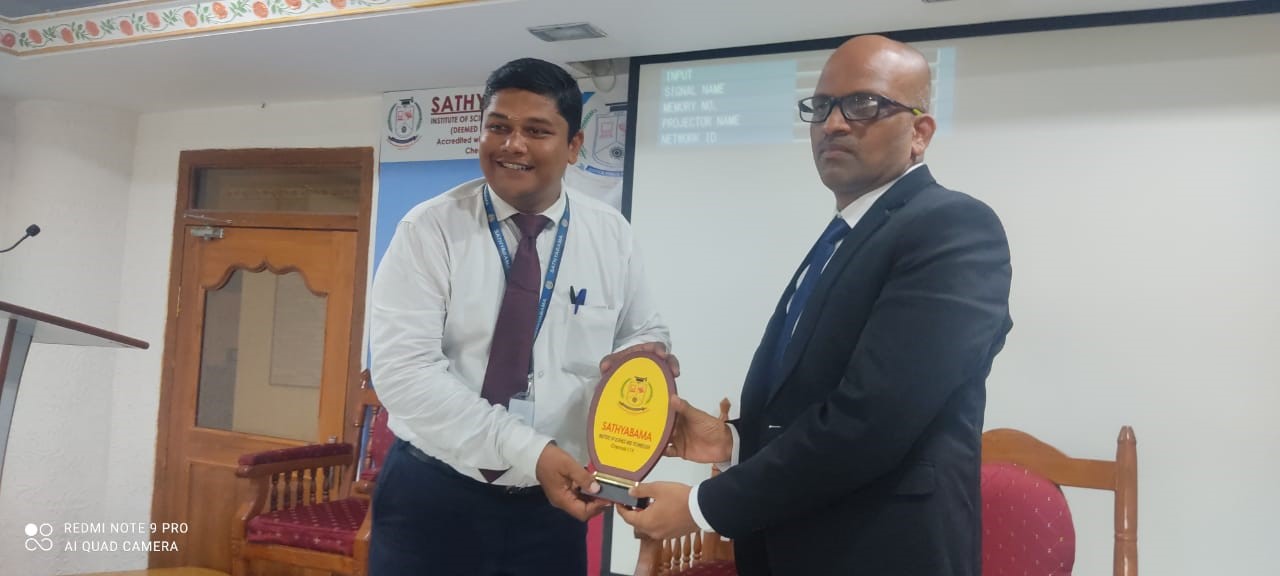
An Online Talk given by Ms.Rakshi, A.D. Speaker : III year B-Tech Biotechnology, Vice-President of Robotics Club, Secretary of Music club on "Molecular Characterization of Internal Transcribed Spacer 2 (ITS 2) “ India conducted by Department of Biotechnology,School of Bio & Chemical Engineering on 3rd May 2022.
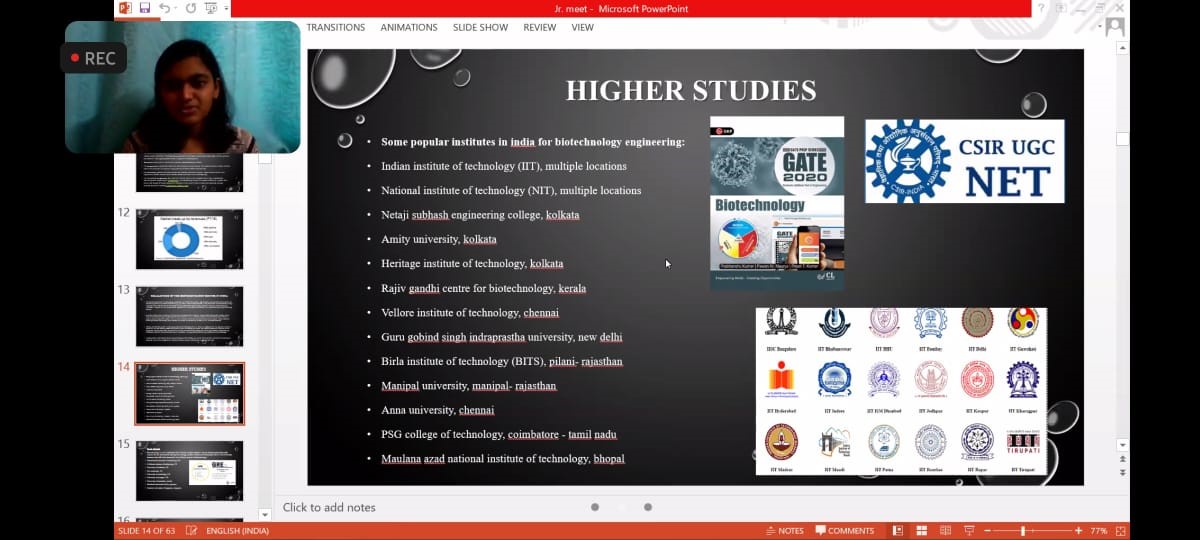
The Department of Biotechnology, School of Bio and Chemical Engineering, Organised an alumni talk on the topic “Highers studies abroad demystified” on 24th July 2021 at 5:00 pm. Alumnus Ms.Lavanya, Research Associate in Tessera Therapeutics, USA spoke about her path from undergraduation to Research Associate. She elaborated on the fascinating opportunities available in United States of America (USA) for Biotechnologists.
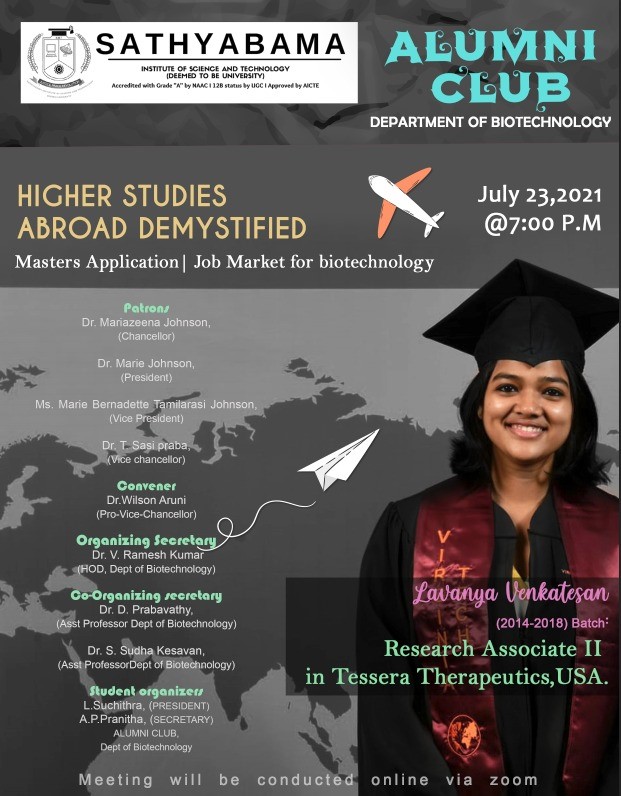
A BioNove Newsletter issue (Dec 2021) by the students of Biotechnology department was released on 25th March 2022.
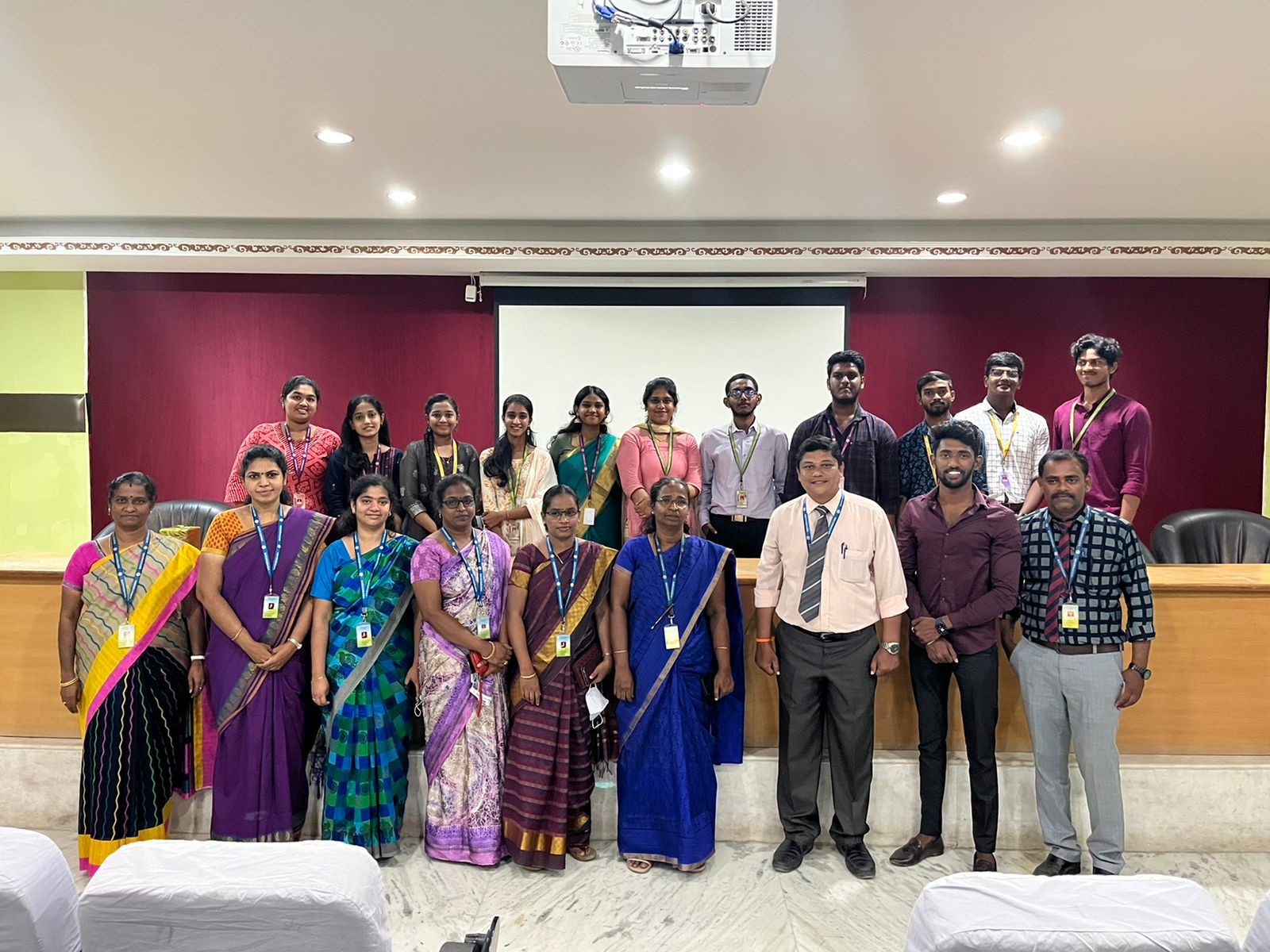
A Value-Added course for Biotechnology students on “Molecular Docking and analysis of Molecular Interaction” on 9th March to 25th March 2022 conducted by the department of Biotechnology, School of Bio & Chemical Engineering.
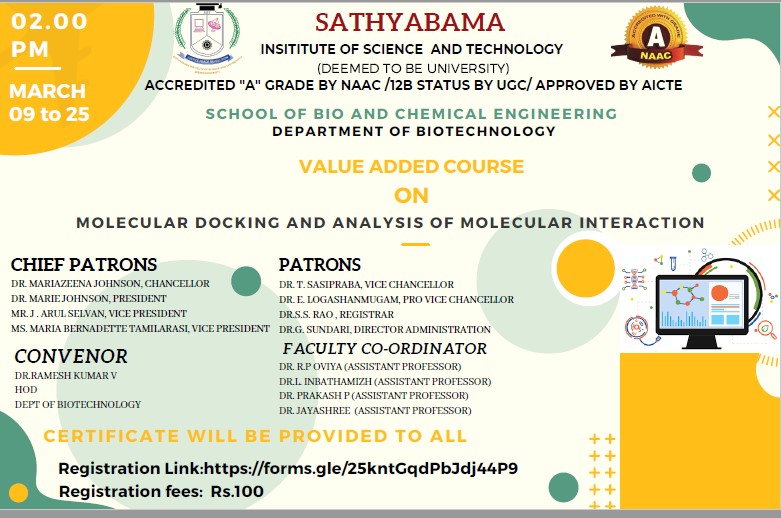
A Workshop on “A broad prospect in animal cell techniques” conducted by Dept of Biotechnology,School of Bio & Chemical Engineering, Sathyabama Institute of Science and Technology on 17th March 2022 to 23rd March 2022.
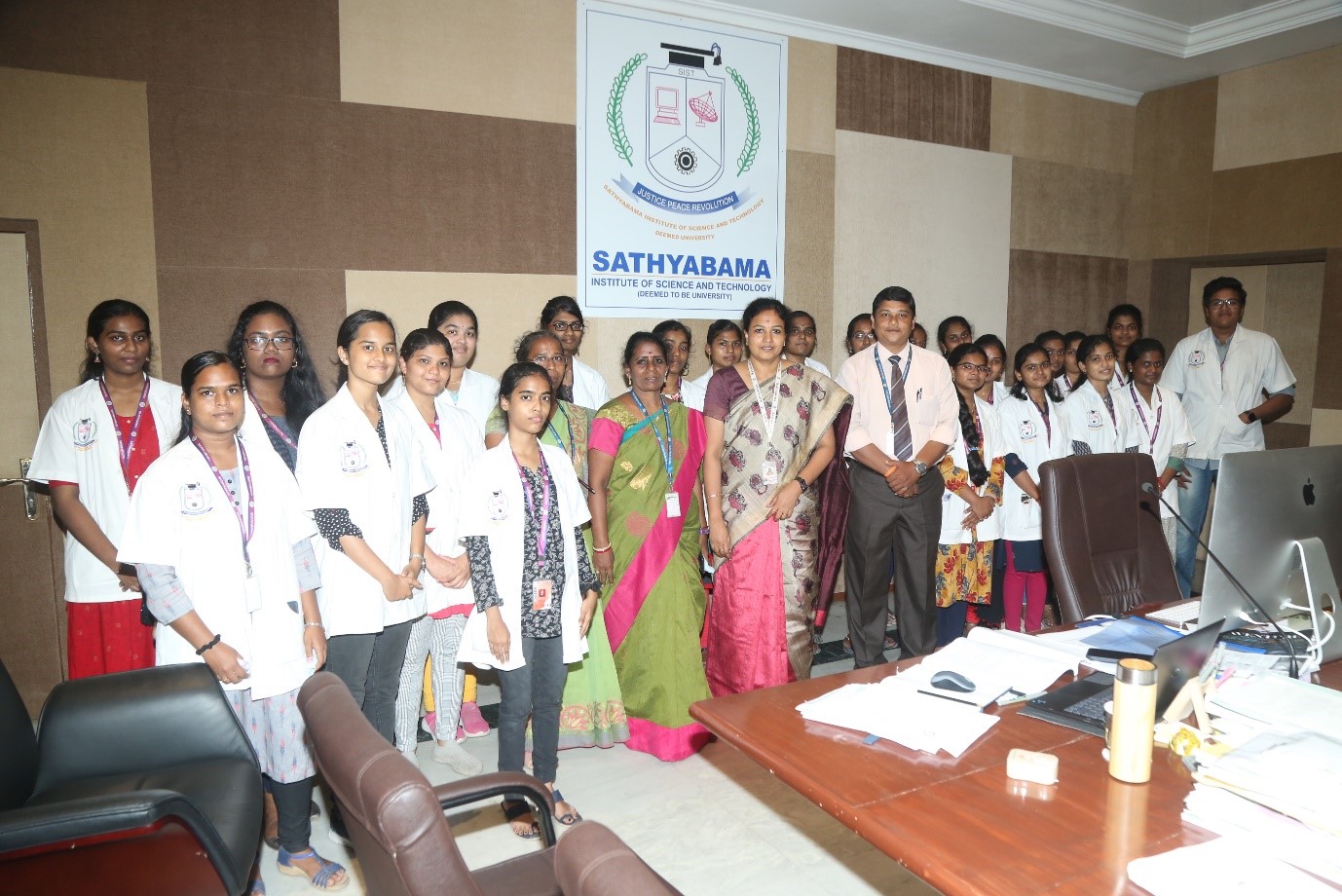
An online lecture by Aluminus Mrs. Cythia Pauline, Design Quality Engineer, Immunoassay Development, Siemens Healthineers, Bangalore on the topic “Enzymes Purification and its industrial applications” on 23 Feb 2022 for the Department of Biotechnology, School of Bio & Chemical Engineering.Chennai-119.
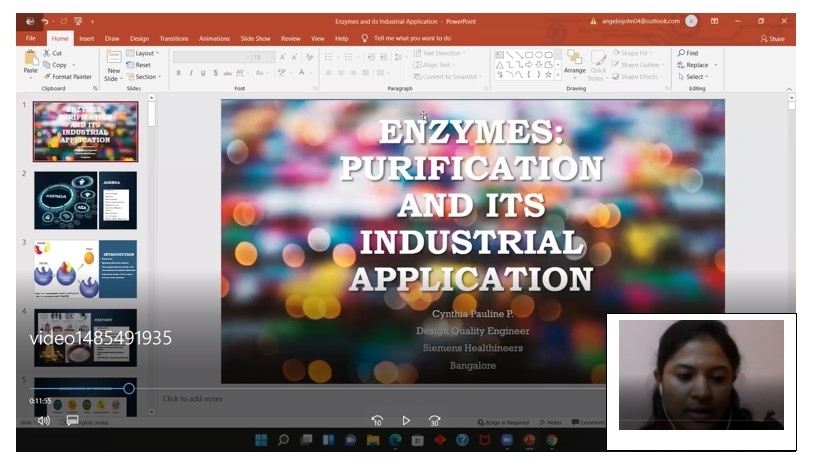
An online Talk by Aluminus Ms.Yoshitha Lakshmanan, Ph.D. Scholar, Biomedical Science, University of Wolverhampton, UK on “ Fields in Biotechnology and Job opportunities in UK" was conducted on 28th Jan 2022 by the Department of Biotechnology,School of Bio&Chemical Engineering, Chennai-119.
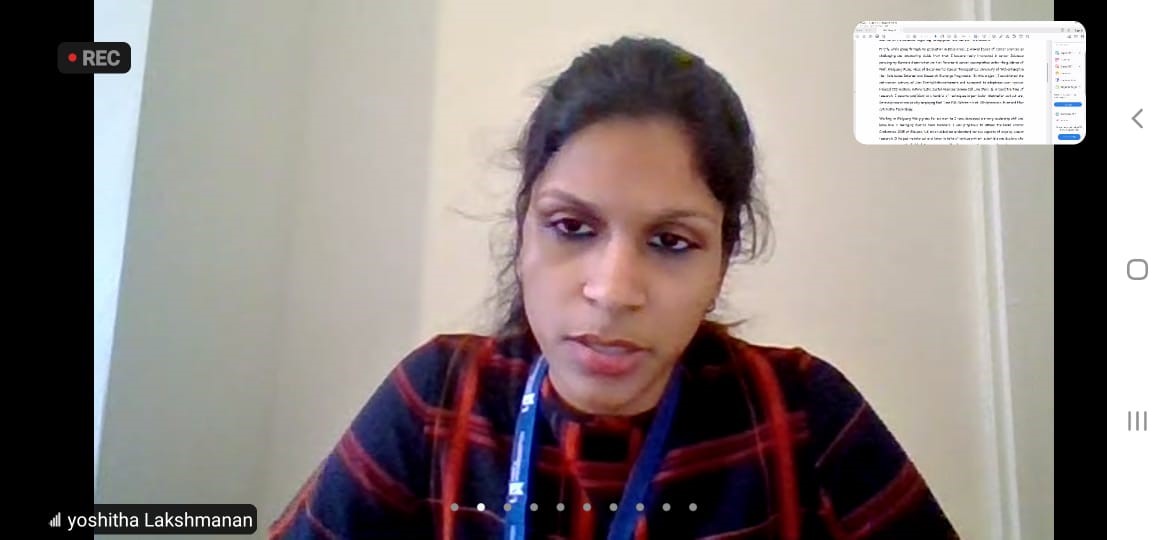
Students of Biotechnology Department participate in various club activities in order to get an exposure about group activities and beyond syllabus technical exposure.
A glimpse the activities participated by students are given below:
FERMENTED FOOD EXHIBITION 2019
Students of Biotechnology exhibited various fermented foods and demonstrated the procedure to produce the fermented foods on during the 19th to 21st AUGUST 2019. They also projected the health benefits of the fermented foods to the participants.
- Grape Wine production
- Strawberry wine
- Jambul wine
- Rose wine
- Kimchi of Korean
- Flavored Yogurt
- Sauerkraut of Russian
- Ginger Beer
- Rice wine
- Bread
- Lemon Pickle
- Mango pickle
- Prawn pickle
- Idly
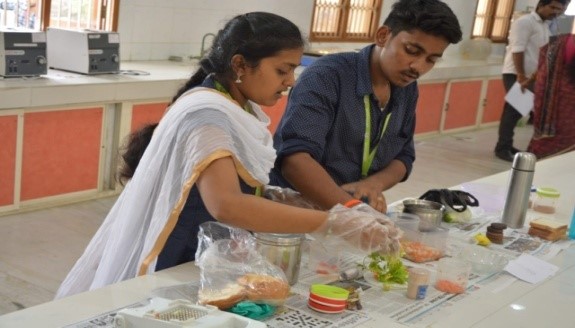
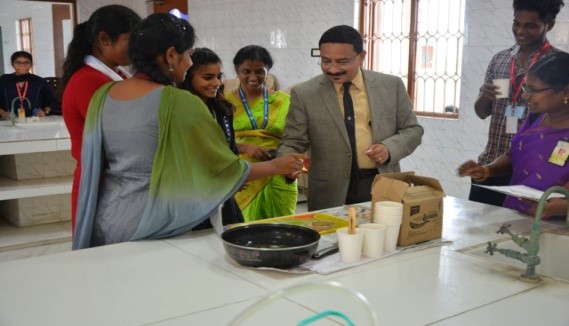
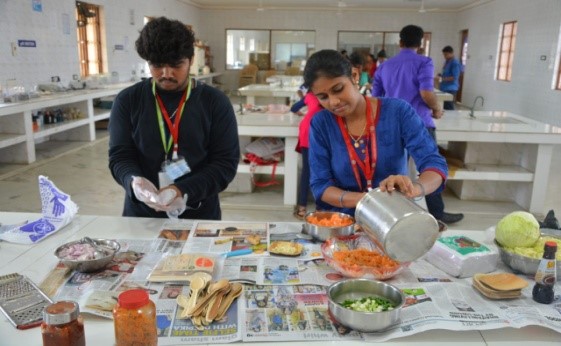
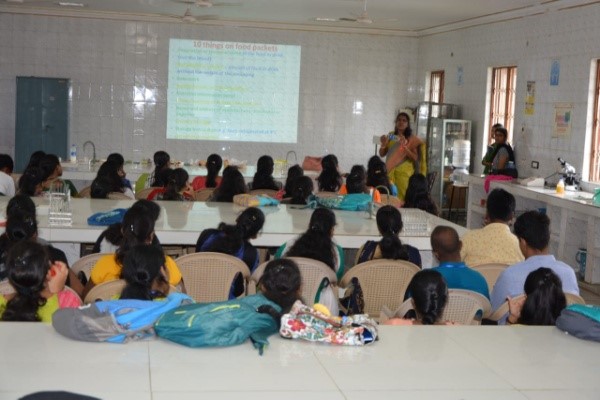
Students and Staff of the Department of Biotechnology conducted SUSTAINABLE ENTREPRENEURSHIP SKILL DEVELOPMENT PROGRAM 2019.
Topics covered were mushroom cultivation, aquaculture, vermicomposting, preparation of panchakavya and seaweed fertilizer, soap preparation, millet cookies, Spirulina and artemia cultivation.
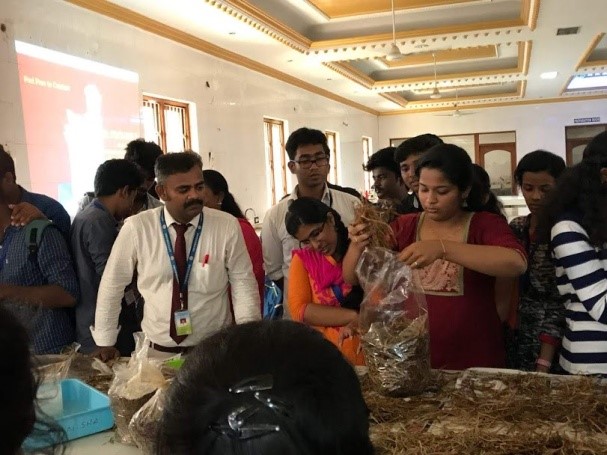
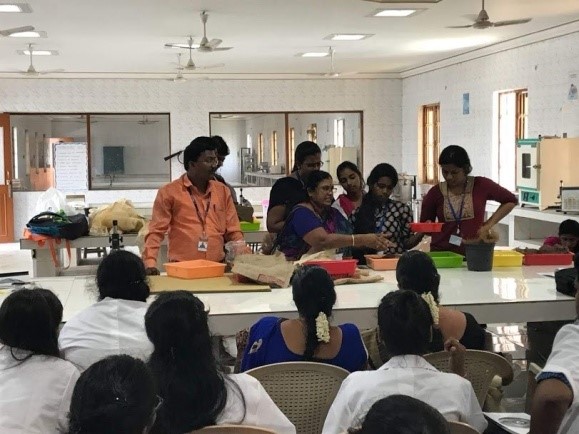
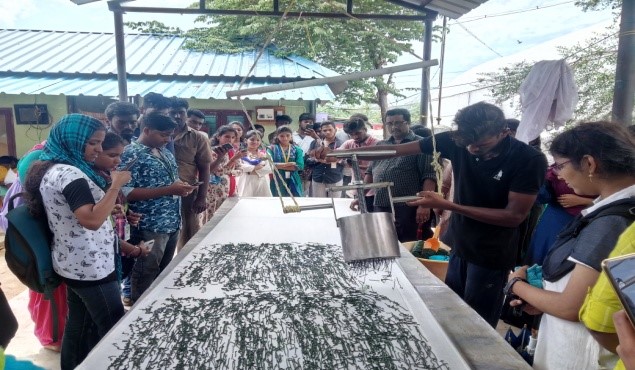
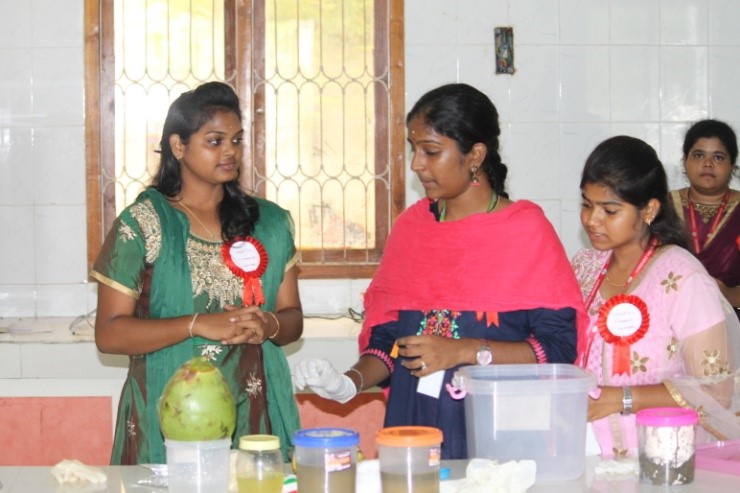
| Professional Body | Description | Logo |
| Bionove | Bionove is a student forum which releases a quarterly newsletter fully edited and compiled by the students of the Biotechnology department | 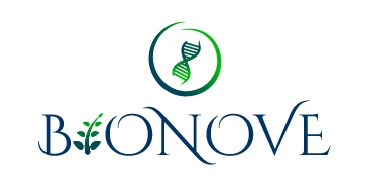
|
| IAAM | Indian Association of Applied Microbiologist | 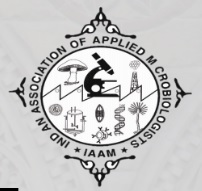
|
| IEI | Institute of Engineers (India) | 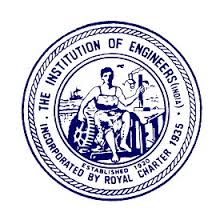
|
Events organized in association with professional bodies
National workshop on Techniques in Biotechnology (NWTBT)
National workshop on Agricultural waste utilization for sustainable environment
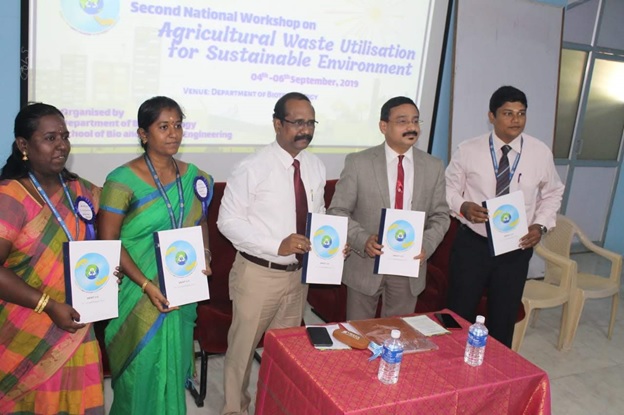
Dr. M. Bavani latha and Dr. S. Usha Nandhini of Dept of Biotechnology, School of Bio & Chemical Engineering were involved in the MAHSA university, Malaysia Faculty mobility program. The duration of the program was two weeks (25th July 2022 to 5th August 2022). During the mobility program, the faculty mentors addressed the undergraduate students of the department of Biosciences and gave lectures during their period of stay.
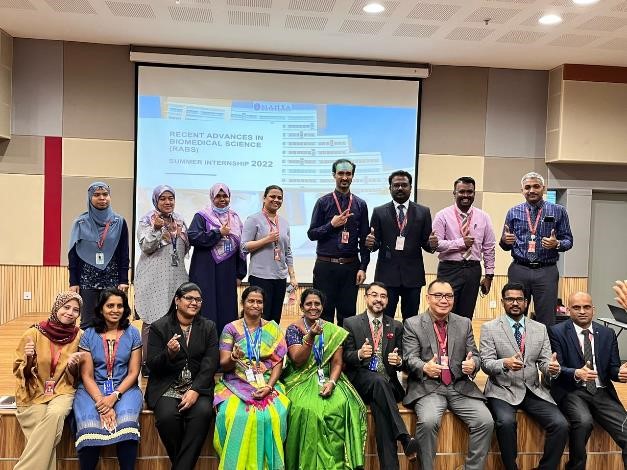
With a plethora of opportunities abroad the students of the Biotechnology programme are highly encouraged to venture into countries abroad with institutions who have signed a memorandum of understanding with us. The students pursue a summer/winter internship abroad.
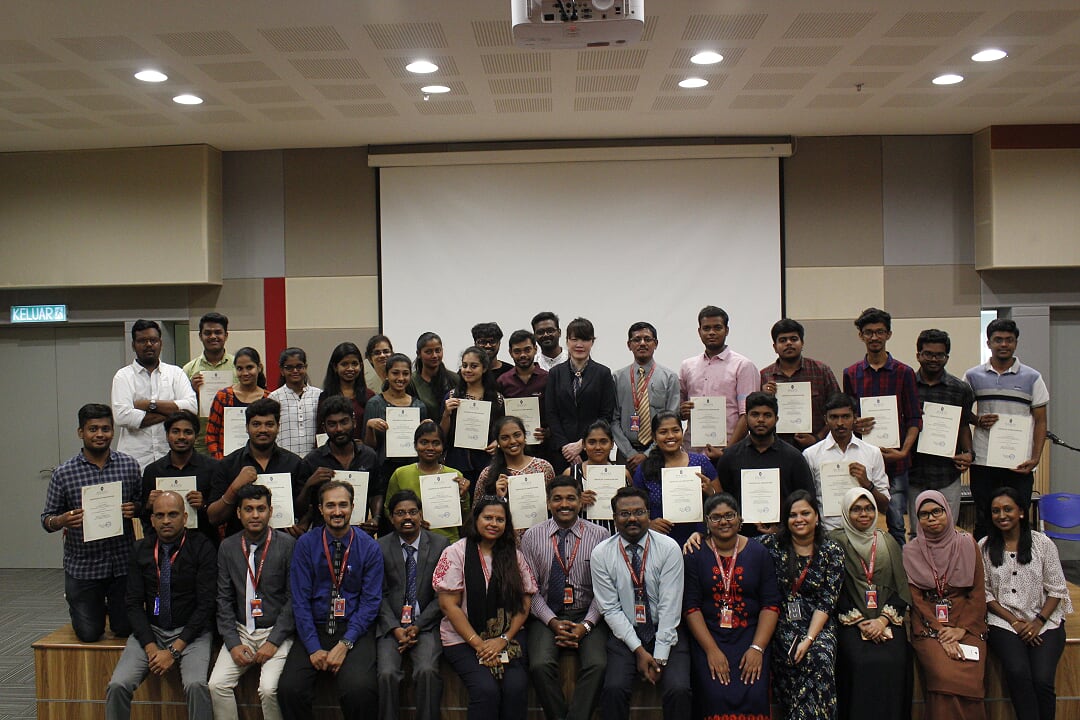


Our students also do their final year project work in institutions abroad which serves as a launchpad for their higher studies.

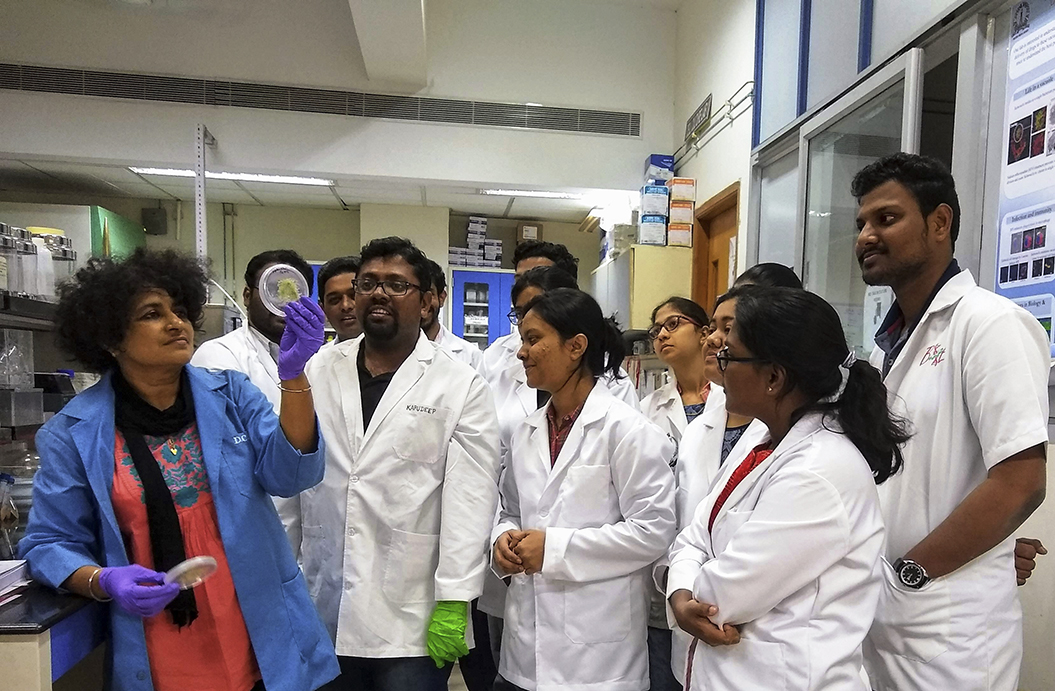
The placement training for the students starts as early as the first year and is blended along with the regular curriculum. The students are trained in the core areas of Biotechnology along with aptitude, logical reasoning and soft skills as expected by the industries. To refine their language skills and communication skills an English language training is provided.
Most of the students get placed in software technology companies which have a separate life sciences division. Also the core companies place the students as trainee engineers to start their career.
The following companies visit the campus for placement:
Distinguished Alumni
